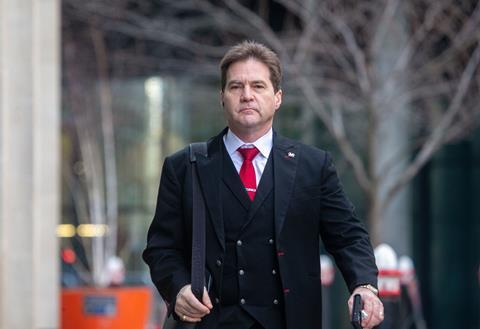The cryptocurrency entrepreneur whose false claims to be bitcoin inventor 'Satoshi Nakamoto' were unravelled after six weeks of court hearings earlier this year will be referred to the Crown Prosecution Service, the judge in the case revealed today.
In his latest judgment in Crypto Open Patent Alliance v Craig Steven Wright Mr Justice Mellor said: 'If what happened in this case does not warrant referral to the CPS, it is difficult to envisage a case which would.'
'I have no doubt that I should refer the relevant papers in this case to the CPS for consideration of whether a prosecution should be commenced against Dr Wright for his wholescale perjury and forgery of documents and/or whether a warrant for his arrest should be issued and/or whether his extradition should be sought from wherever he now is. All those matters are to be decided by the CPS.’
Businessman Stefan Matthews, who while under oath told a 'barefaced lie' that Wright had shown him a version of the seminal bitcoin white paper more than a year before its publication, will also be referred, the judge said.

In the 64-page judgment today, the judge also ruled on applications for injunctions and claims for costs in two cases. He ordered Wright and his companies to make interim payments of 85% and 90% of total certified costs. However he declined a request to order disclosure of Wright's funding arrangements. Noting that Wright's funders 'seem to be continuing to fund substantial costs on his side,' he elected to give them 'the benefit of the doubt'.
Ruling on a raft of other issues arising from the case, Mellor granted injunctions barring Wright from attempting to re-litigate his claim. However he found it 'disproportionate' to order Wright to remove all published statements asserting his claim. He also found a demand for Wright to publish a half-page notice in The Times setting out the court's finding as a 'somewhat vindictive response'.
An application to dispense with personal service on the founds that Wright has left the jurisdiction and is either 'deliberately evading service' or 'is very difficult to locate' is fully justified, the judge ruled.
The judgment also reveals that Wright has not made good his stated intention to apply to the High Court for permission to appeal. While that does not preclude a direct application to the Court of Appeal, Mellor observed, 'in a case of this complexity, the judge at first instance is often able to shed light on any proposed grounds of appeal'.
This article is now closed for comment.



























3 Readers' comments